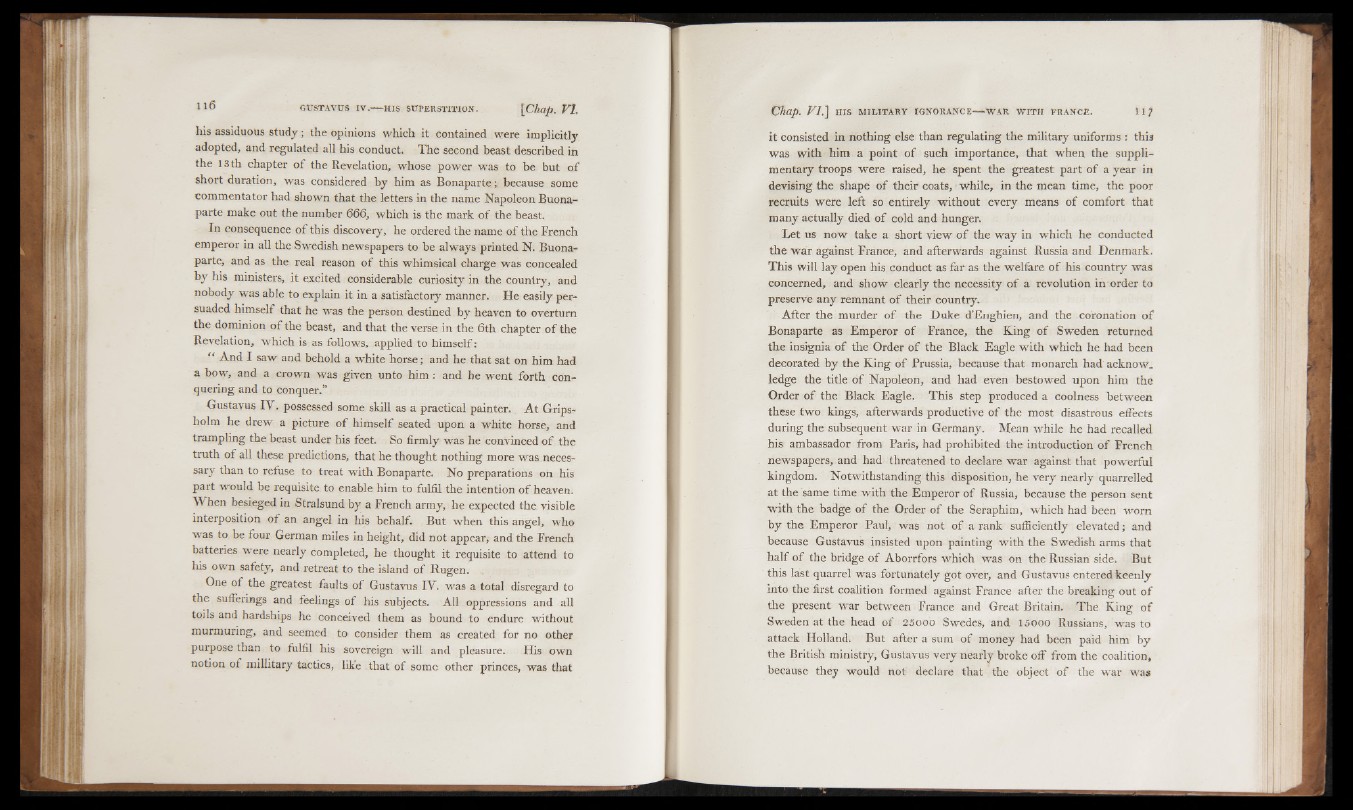
his assiduous study; the opinions which it contained were implicitly
adopted, and regulated all his conduct. The second beast described in
the 13 th chapter o f the Revelation, whose power was to be but of
short duration, was considered by him as Bonaparte; because some
commentator had shown that the letters in the name Napoleon Buonaparte
make out the number 666, which is the mark o f the beast.
In consequence o f this discovery, he ordered the name of the French
emperor in all the Swedish newspapers to be always printed N. Buonaparte,
and as the real reason o f this whimsical charge was concealed
by his ministers, it excited considerable curiosity in the country, and
nobody was able to explain it in a satisfactory manner. He easily persuaded
himself that he was the person destined by heaven to overturn
the dominion o f the beast, and that the verse in the 6th chapter of the
Revelation, which is as follows, applied to himself:
“ And I saw and behold a white horse; and he that sat on him had
a bow, and a crown was given unto him: and be went forth conquering
and to conquer.”
Gustavus IV, possessed some skill as a practical painter. A t Grips-
holm he drew a picture o f himself seated upon a white horse, and
trampling the beast under his feet. So firmly was he convinced of the
truth o f all these predictions, that he thought nothing more was necessary
than to refuse to treat with Bonaparte. No preparations on his
part would be requisite to enable him to fulfil the intention o f heaven.
When besieged in Stralsund by a French army, he expected the visible
interposition o f an angel in his behalf. But when this angel, who
was to be four German miles in height, did not appear, and the French
batteries were nearly completed, he thought it requisite to attend to
his own safety, and retreat to the island o f Rugen.
One o f the greatest faults of Gustavus IV. was a total disregard to
the sufferings and feelings o f his subjects. All oppressions and all
toils and hardships he conceived them as bound to endure without
murmuring, and seemed to consider them as created for no other
purpose than to fulfil his sovereign will and pleasure. His own
notion of millitary tactics, like that of some other princes, was that
it consisted in nothing else than regulating the military uniforms : this
was with him a point o f such importance, that when the suppli-
mentary troops were raised, he spent the greatest part o f a year in
devising the shape o f their coats, while, in the mean time, the poor
recruits were left so entirely without every means of comfort that
many actually died of cold and hunger.
Let us now take a short view o f the way in which he conducted
thé war against France, and afterwards against Russia and Denmark.
This will lay open his conduct as far as the welfare o f his country was
concerned, and show clearly the necessity o f a revolution in order to
preservé any remnant o f their country.
After the murder o f the Duke d’Enghien, and the coronation of
Bonaparte as Emperor o f France, the King o f Sweden returned
the insignia o f the Order of the Black Eagle with which he had been
decorated by the King o f Prussia, because that monarch had acknow.
ledge the title o f Napoleon, and had even bestowed upon him the
Order of the Black Eagle. This step produced a coolness between
these two kings, afterwards productive of the most disastrous effects
during the subsequent war in Germany. Mean while he had recalled
his ambassador from Paris, had prohibited the introduction o f French
newspapers, and had threatened to declare war against that powerful
kingdom. Notwithstanding this disposition, he very nearly quarrelled
at the same time with the Emperor o f Russia, because the person sent
with the badge o f the Order of the Seraphim, which had been worn
by the Emperor Paul, was not o f a rank sufficiently elevated ; and
because Gustavus insisted upon painting with the Swedish arms that
half o f the bridge of Aborrfors which was on the Russian side. But
this last quarrel was fortunately got over, and Gustavus entered keenly
into the first coalition formed against France after the breaking out of
the present war between France and Great Britain. The King of
Sweden at the head of 25ooo Swedes, and 15000 Russians, was to
attack Holland. But after a sum o f money had been paid him by
the British ministry, Gustavus very nearly broke off from the coalition,
because they would not declare that the object o f the war was